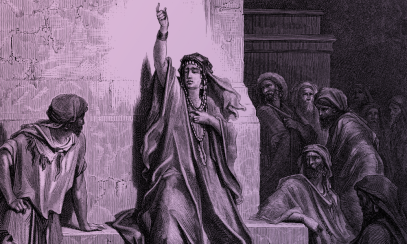Divorce and Remarriage in the Church
The Extraordinary Synod of Bishops on the Family in October 2014 and the upcoming Ordinary Synod on the Family in October 2015 have made reflection on the vocation and mission of the family, both in the Church and in the modern world, very timely. So during 2015, Theology 101 will explore the Church’s teaching on many of the themes being considered by the two synods.
The shattering effect of divorce on communion
The Catechism of the Catholic Church states in the first paragraph of the first page that we were created freely and out of love by God for eternal life in communion with God. Communion with God is the destiny planned for humanity, and the goal and foundation of Christian life. Of course, this is only possible in Jesus Christ through the power of the Holy Spirit, who alone is the agent of communion.
Now in marriage, the spouses are invited to participate in the divine life of communion precisely because marriage itself is an intimate community of life and love. Divorce ruptures communion and thereby introduces disorder into the relationship with God, between the spouses, within the family and throughout society. The fact that the rate of divorce in the United States alone is around 50 percent only amplifies the potential destructive impact divorce can exert upon the nation as a whole.
The Church’s teaching on divorce and remarriage
The Catechism of the Catholic Church notes that Jesus insisted that it was the Father’s will that marriage be indissoluble. Given this (and the aforementioned discussion on communion), it should come as no surprise that the Church holds that when a marriage is between two baptized persons, no human power can dissolve it for any reason other than death.
The catechism (2383) goes on to state, however, that a civil divorce “can be tolerated and does not constitute a moral offense” if it represents the “only possible way of ensuring certain legal rights, the care of children or the protection of inheritance.” Nonetheless, divorce is considered a grave offense against the natural law and it does harm to the covenant of salvation, of which sacramental marriage is the sign. Further, divorce is immoral because of the aforementioned disorder it introduces into the family and society. It is a disorder that can bring “grave harm to the deserted spouse, to children traumatized by the separation of their parents and often torn between them, and because of its contagious effect.” (2385)
Remarriage, even if it is recognized by civil law, only compounds the gravity of divorce by adding the sin of adultery to the equation if the first marriage was indeed valid. The Catholic in this state of adultery cannot receive the Eucharist as long as the situation persists. At the same time, if he or she keeps the faith and desires to bring up children in the faith, they must not consider themselves separated from the Church, “in whose life they can and must participate as baptized persons.” (1651)
So what did the Extraordinary Synod have to say?
First and foremost, the Extraordinary Synod of Bishops on the Family affirmed the indissoluble character of marriage. At the same time, the synod urged mercy and patience toward those who are divorced and remarried, even as the Church faithfully works to help them understand “the divine pedagogy of grace in their lives and offering them assistance so they can reach the fullness of God’s plan for them.” (25)
Just as the Holy Spirit works to restore communion where it is ruptured, the Church, as the body of Christ, must also engage in the pastoral work of charity and mercy “to help persons recover and restore relationships.” (44) To this end, the synod encouraged the practice of the “art of accompaniment” that respects the suffering of and offers assistance to those who have been the victims of divorce.
In terms of topics to be discussed in the Synod of Bishops on the Family in October 2015, the Extraordinary Synod suggested looking at the procedure of annulments to determine if the process could be made more accessible and less time-consuming. In addition, the bishops indicated that divorced people who have not remarried should be encouraged to seek the Eucharist, while those who are divorced and remarried should be encouraged to participate in the life of the community. Finally, the question as to whether or not the divorced and remarried should be granted access to the sacraments of penance and the Eucharist under very specific conditions was raised in the final report. However, the final report acknowledged that this final question needed thorough examination.
At a Glance: Declarations of Nullity
A declaration of nullity, popularly called an annulment, consists of a Church tribunal declaring that a marriage thought to be valid according to canon law in actuality did not meet one of the essential elements required for it to be a binding union. A valid Catholic marriage results from five elements:
- the spouses are free to marry;
- they freely exchange their consent;
- in consenting to marry, they have the intention to marry for life, to be faithful to one another and be open to children;
- they intend the good of each other; and
- their consent is given in the presence of two witnesses and before a properly authorized Church minister. Exceptions to the last requirement must be approved by Church authority.
Source: United States Catholic Conference of Bishops website. www.usccb.org.
A declaration of nullity is required for one who is divorced (and whose first spouse is still alive) to get remarried in the Church or to have a second marriage validated by the Church. An annulment is also required for one who is divorced and remarried prior to that person being initiated into the Catholic Church.
See Canon 1095 of the Code of Canon Law for a more detailed treatment of marital consent.



